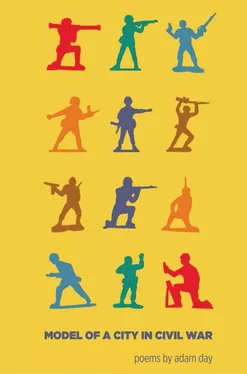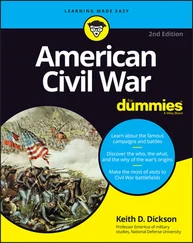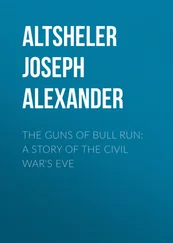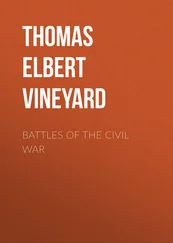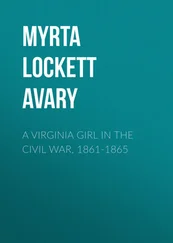APPREHENDED AT A DISTANCE
The colorless lake — buoy bells
in fog; groaning, algaed pylons.
The impractical sand, clouds hanging
in dystrophy. Blue trees below the struts
of a radio telescope. A hare racing
through the tide. Eels dead and alive
sold from back of a truck. A preacher
stumbling over a mastiff, like a little man;
the insinuation of a human on a chain—
the slobbering aperture. A street sweeper
swinging his broom like a scythe. A starling
speaks and goes. Like someone who has a choice.
SNOW IN A BRICK COURTYARD
On a kitchen window’s slate ledge,
a swallow, white chest dusted orange
from the moth in its beak. Across
the courtyard, a black dog perched
atop its house, one ear pricked
to the wind. A rusty nail
sticks up from a sodden
half-buried plank, shocking the snow
with a faint russet pulse. And a child’s
distant croup-cough seems to stir
snow from frost-glazed branches.
Here is the cloud-helmeted sun, and here
is the world smoothed and close
to the eyes, like the gleam of cupped hands
bathing a face above a sink’s darkening basin.
… which even now Jack
was preparing. When he knelt
at the roof’s edge and threw
crushed ice over the yard
it began to snow
all over town, and I saw
milk running in sheets
down a blackboard, children swerving
through the darkness
in their underwear,
and Marcus riding the carousel’s
bearded seal — bending to whisper
into its ear, his long upper lip
flat and sweating.
It was the coldest night
of the year — the cats were in heat.
Snagged in a barbed fence, bands of phlegm
at my lips, having already left
flesh on the humming wire, I imagined
myself capable of standing. With hands
like the absent farmer’s — with his vulgar
pride in mediocrity, his waterlogged
pornography, and Great Dane called Hamlet—
instead of these clumsy, mud-clotted hooves.
In work boots — a tattoo of snow in the pattern
of a paddlewheel on my coat — clipping
the farmer and his people above the ankles,
like mallards, from the frozen pond, impaling
them with straightened bedsprings
for posing — their eyes train windows,
blank and daubed with pollen, their bodies thrown
over my shoulder, legs bundled like iris stems.
The pig with the black feet is an insomniac.
Long ago kids left a mask filled with leaves
in the yard. Now the insomniac wears it—
leaning his head down, snuffing, it sticks
to his moist snout, and he’s Marlon Brando.
We find hidden, delicately stripped orange
skins, candy wrappers, and shredded letters
that name him, Albert. He’s like a Russian—
enormous, vulnerable, perhaps tragic—
a lover of darkness: snow-capped trashcans,
coal bins, ships’ holds, sinkholes. He wanders
in the nightwoods for days, sending back
sounds like the ripple of radio voices
until it’s not Christmas, just one more day
and he hangs by his slick black feet, unzipped,
the warm wet release lipping his chin.
Never indiscriminate in his passions
he understood being human, the chasm
between the classes, but never condescended,
even when he must have known he’d be eaten
on paper plates with potatoes and a couple of carrots.
WE LIVED ABOVE THE KEY SHOP
When I was a child
father came home
with hands for us. Before,
it was our faces
to the plate — now
we could eat
with ease. Our feet
he smuggled home
just in time for us
to begin school. Imagine
my sister and I,
only a spectral space
between our ankles
and cold linoleum. Eyes
came days later
but those he stole
from the Vietnamese
couple down the street—
they screamed after him
in their language
to bury them
at the seashore with crab claws
and the scales of shad. We saw
that first day of classes,
the walleyed cruelty
of our peers — an overweight
boy strapped in
a Miss Somewhere sash—
and something shrunk
inside of us so small
that sparrows were born
from our faces and blew about
until they crumbled and we
caught them on our tongues
but were always unsatisfied—
it’s hunger we were born with.
CLEAN LINES, DIFFUSE LIGHTING
Sometimes the old man cut
mother’s hair; there were limits even
to his failure. Other times, when
we were in the mood that someone
should pay for what we found
intolerable — field mice, threatening
rain, a shout in the street — he
might even cut himself. He was
so mild he began to snow. It’s all
made quite beautiful now, really,
with clean lines and diffuse lighting.
He butts her, with bathwater in the divot beneath her nose, this cat
of ours, and washes his face of her, fur curled back
like a moist leaf.
Between thumb and two fingers I rub his ears, as coarse
with dirt as a snail’s etched shell.
And here, because of the closeness
of the night sky, cicadas’ wings seem enormous, sweeping things.
Far from here, seagulls hover above stairs that descend into water.
We have never been so far from shore.
Yesterday, she and I climbed
our house’s forest of rafters to the highest windows to see
how much desert we could see.
Thistle, thistle, black swallowtail,
cottonwood that signals, finally, a creek nearby that we walk out to,
and watch
its bottom-layer of detritus, dusted with mud, waves
upward, loosening memories of cold green hills,
lamps swinging
over them in darkness. The smell of warm bricks and the rain
on them. And on the mill’s dam a shard of broken bottle
flashing, and the black shadow
of our cat rolling by, waiting
for fish heads thrown
into the canal — the creases between my nails and fingers filled
with blood
from the cleaning. Walking in from the porch, she is lying
in bed — like my own hands looked at long enough, she becomes
strange. On the roof the copper vane is tacking in strong wind.
Quiet breathing,
flushed ears, errant hairs thick as wet grass, the webbing
between her forefinger and thumb thin as bleached leaves.
And perhaps later we walk out over the sand, without waking, pounding
out some secret we bury in desert darkness.
The pads of his palms are cool and mapped
with wet creases like blades of grass. His figure
arranges itself in my head. His is the sleep
of furniture. There were lots of times
I didn’t love him. But it’s been said I look
like him, or a famous director. The French
always say things are the same when
they aren’t, at all. Someone asked him once,
“Which god do you mean?” “Yours,
if you like,” he answered. That he was sometimes
horrible and still lived, that he was
often horrible and somehow we loved him.
Eighty, I’m up at eight, bathe
and trifle about until lunch. After,
I have a cup of bourbon and coffee,
It makes my mind race. I’m seeking
help. Do I get breathless when I exercise?
I’d hardly know. I have reached the age
now when my daughter can beat me
at croquet. It took me a long time
to become a human being. I can’t say
I have a lot of hope
for the whole thing. I procrastinate
by answering email. My neighbors
judge me now entirely on the cut
of my coat; but we’re all equally poor
so the verdict is softly given.
Beside my bed the radio plays; I read
Malone muert . My world is fairly floorboardish.
Outside, the drab reiteration
of brickwork, dahlias spring
from a moldering mattress, charred
timber litters the leaf-brindled rainwater.
My favorite room is the kitchen,
though I’ve given up on eating—
I’ve gotten to where I don’t like
to have food in my mouth, and heaven
is the moment after constipation.
I’ve grown not ugly, but entirely
unattractive. Bathing now, my eyes
are drawn to the wide-wrinkled, two-potato
sack at my crotch. Though, you’ll be
happy to know, even now my sex life could
fill more than one wet holiday weekend. Still,
passive as a toilet, I want my God back.
Читать дальше
